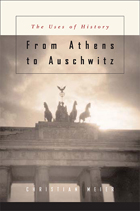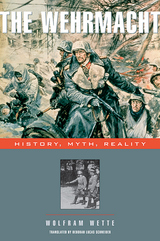
The conquests of Alexander the Great transformed the Greek world into a complex of monarchies and vying powers, a vast sphere in which the Greek city-states struggled to survive. This is the compelling story of one city that despite long periods of subjugation persisted as a vital social entity throughout the Hellenistic age.
Christian Habicht narrates the history of Athens from its subjugation by the Macedonians in 338 B.C. to the battle of Actium in 31 B.C., when Octavian's defeat of Mark Antony paved the way for Roman dominion over the Hellenistic world. For nearly three centuries Athens strove unsuccessfully for sovereignty; its foreign policies were shaped by the dictates first of the Macedonian monarchy and later of the Roman republic. Yet the city never relinquished control of internal affairs, and citizen participation in its government remained strong. Habicht lucidly chronicles the democracy's setbacks and recoveries over these years as it formed and suffered the consequences of various alliances. He sketches its continuing role as a leader in intellectual life and the arts, as Menander and other Athenian playwrights saw their work produced throughout the Greek world; and the city's famous schools of philosophy, now including those of Zeno and Epicurus, remained a stellar attraction for students from around the Mediterranean. Habicht has long been in the forefront of research on Hellenistic Athens; in this authoritative yet eminently readable history he distills that research for all readers interested in the ancient Mediterranean world.

The use of perspective in Renaissance painting caused a revolution in the history of seeing, allowing artists to depict the world from a spectator’s point of view. But the theory of perspective that changed the course of Western art originated elsewhere—it was formulated in Baghdad by the eleventh-century mathematician Ibn al Haithan, known in the West as Alhazen. Using the metaphor of the mutual gaze, or exchanged glances, Hans Belting—preeminent historian and theorist of medieval, Renaissance, and contemporary art—narrates the historical encounter between science and art, between Arab Baghdad and Renaissance Florence, that has had a lasting effect on the culture of the West.
In this lavishly illustrated study, Belting deals with the double history of perspective, as a visual theory based on geometrical abstraction (in the Middle East) and as pictorial theory (in Europe). How could geometrical abstraction be reconceived as a theory for making pictures? During the Middle Ages, Arab mathematics, free from religious discourse, gave rise to a theory of perspective that, later in the West, was transformed into art when European painters adopted the human gaze as their focal point. In the Islamic world, where theology and the visual arts remained closely intertwined, the science of perspective did not become the cornerstone of Islamic art. Florence and Baghdad addresses a provocative question that reaches beyond the realm of aesthetics and mathematics: What happens when Muslims and Christians look upon each other and find their way of viewing the world transformed as a result?

What does history mean today? What is its relevance to the modern world? In contemplating fundamental questions about history and the Western legacy, the noted classical historian Christian Meier offers a new interpretation on how we view the world.
Meier sees an “absence” of history in contemporary Europe and throughout the West—an absence he attributes to the way modern historians have written about history and, more important, to the dramatic transformations of the twentieth century. He argues for the central legacy of Western civilization. He tackles the difficulty of reconciling a historical perspective with our era of extreme acceleration, when experience is shaped less by inheritance and legacy than by the novelty of changes wrought by science and globalization. Finally, Meier contemplates the enormity of the Holocaust, which he sees as a test of “understanding” history. If it is part of the whole arc of the Western legacy, how do we fit it with the rest?
This engaging and thought-provoking meditation challenges us to rethink the role of history in Western culture and a changing world.

In one concise volume, Hagen Schulze brilliantly conveys the full sweep of German history, from the days of the Romans to the fall of the Berlin Wall. A story two thousand years in the making, it rings with battle, murmurs with intrigue, and hums with the music of everyday life. This richly various legacy, often overshadowed and distorted by the nation's recent past, offers a hopeful answer to the perennial question of what kind of country Germany is and will be.
From the revolt of the indigenous tribes against Roman domination, Schulze leads us through the events that have defined a nation at the center of European culture--the Thirty Years' War and the decline of the Holy Roman Empire, Luther's Reformation and Bismarck's attendance at the birth of modern Germany, the Great War and its aftermath, the nationalistic megalomania under Hitler, the division of the nation after World War II and its reunification. Throughout, we see what these developments have meant for the German people, in the arena of private life and on the stage of world history. A lavish array of illustrations provides a lively counterpoint to Schulze's elegantly written narrative.
As it follows the threads of German language, nationalism, and culture to the present day, this dramatic account provides ample reassurance that recent history will not repeat itself. Germany: A New History will prove indispensable to our understanding of Germany, past and present, and the future of Europe.



Pompeii's tragedy is our windfall: an ancient city fully preserved, its urban design and domestic styles speaking across the ages. This richly illustrated book conducts us through the captured wonders of Pompeii, evoking at every turn the life of the city as it was 2,000 years ago.
When Vesuvius erupted in 79 A.D. its lava preserved not only the Pompeii of that time but a palimpsest of the city's history, visible traces of the different societies of Pompeii's past. Paul Zanker, a noted authority on Roman art and architecture, disentangles these tantalizing traces to show us the urban images that marked Pompeii's development from country town to Roman imperial city. Exploring Pompeii's public buildings, its streets and gathering places, we witness the impact of religious changes, the renovation of theaters and expansion of athletic facilities, and the influence of elite families on the city's appearance. Through these stages, Zanker adeptly conjures a sense of the political and social meanings in urban planning and public architecture.
The private houses of Pompeii prove equally eloquent, their layout, decor, and architectural detail speaking volumes about the life, taste, and desires of their owners. At home or in public, at work or at ease, these Pompeians and their world come alive in Zanker's masterly rendering. A provocative and original reading of material culture, his work is an incomparable introduction to urban life in antiquity.

The Psyche and Schizophrenia offers a remarkably clear and comprehensive treatment of biopsychosocial development and psychotic processes. This extraordinary work lays the theoretical foundation for understanding the relationships between feeling and thinking (affect and logic) in normal as well as in pathological conditions, especially schizophrenia. Ciompi's affective-cognitive theory integrates interpersonal, familial, and social interactions with intrapsychic mental structures and yields startling new insights into the origins of "schizophrenic alienation." While Ciompi acknowledges the important role that genetic and biological models play in schizophrenia, he maintains that it is largely the psychosocial factors that determine long-term prognosis. Thus, The Psyche and Schizophrenia elaborates a number of new therapeutic approaches to the management of biological as well as environmental influences.
Drawing upon Piaget, Freud, and systems theory, as well as advanced current research, Ciompi develops a new model of the normal and pathological functioning of the psyche. This model presents cognition and emotion, the structure of logic and the dynamics of affects, as a complementary system governed by "ubiquitous laws of equilibrium."
In this brilliant synthesis of theoretical and empirical research, Ciompi proposes his novel theory of an "affectlogic" that probes the affective structures of logic as well as the logical structures of the emotions. Original in its conception and elegantly written, The Psyche and Schizophrenia is a major contribution to research on schizophrenia, and its penetrating insights and thorough analysis are sure to enrich the field of psychiatry for years to come.

This book is a profound reexamination of the role of the German army, the Wehrmacht, in World War II. Until very recently, the standard story avowed that the ordinary German soldier in World War II was a good soldier, distinct from Hitler's rapacious SS troops, and not an accomplice to the massacres of civilians. Wolfram Wette, a preeminent German military historian, explodes the myth of a "clean" Wehrmacht with devastating clarity.
This book reveals the Wehrmacht's long-standing prejudices against Jews, Slavs, and Bolsheviks, beliefs that predated the prophecies of Mein Kampf and the paranoia of National Socialism. Though the sixteen-million-member German army is often portrayed as a victim of Nazi mania, we come to see that from 1941 to 1944 these soldiers were thoroughly involved in the horrific cleansing of Russia and Eastern Europe. Wette compellingly documents Germany's long-term preparation of its army for a race war deemed necessary to safeguard the country's future; World War II was merely the fulfillment of these plans, on a previously unimaginable scale.
This sober indictment of millions of German soldiers reaches beyond the Wehrmacht's complicity to examine how German academics and ordinary citizens avoided confronting this difficult truth at war's end. Wette shows how atrocities against Jews and others were concealed and sanitized, and history rewritten. Only recently has the German public undertaken a reevaluation of this respected national institution--a painful but necessary process if we are to truly comprehend how the Holocaust was carried out and how we have come to understand it.
READERS
Browse our collection.
PUBLISHERS
See BiblioVault's publisher services.
STUDENT SERVICES
Files for college accessibility offices.
UChicago Accessibility Resources
home | accessibility | search | about | contact us
BiblioVault ® 2001 - 2024
The University of Chicago Press









